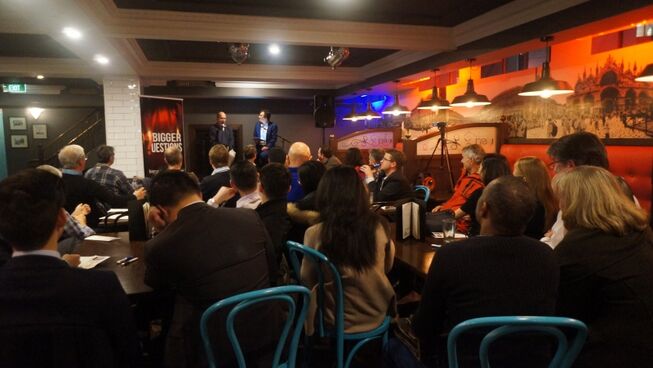Religion and politics: a toxic mix?

The first governor General of Pakistan claimed,
‘Religion should not be allowed to come into politics...Religion is merely a matter between man and God’
This is a common belief in our society. So much so that many want religion completely out of politics. Yet others think that the mix is essential for a flourishing society. So what should be the relationship between religion and politics? Is it a harmonious or a toxic mix?
With a federal election imminent, we held a Logos Live forum just a couple of weeks ago to help us think through this question further. We interviewed Vickie Janson (Victorian senate candidate for the Australian Christians political party) and Barney Zwartz (Senior Fellow at the Centre for Public Christianity and formerly the Religion Editor at The Age).
We had a fascinating and entertaining conversation. The episode has just been broadcast/podcast and you can listen here.
Why is this a controversial issues in contemporary society?
Barney said that there were a couple of reasons for its controversy:
- Australians have enjoyed a "delicate" relationship with religion in the past. They are happy for it to be there, but they don't like it 'thrust down their throats'.
- There is also an increasingly aggressive secular approach, particularly in the media, which wants religion out of everywhere except for the private living room.
Hence there is a general feeling that Australians don't want to be overtly influenced and affected by politics.
Yet whether we like it or not, our political discourse is influenced by ideology, whether that ideology springs from religion or other sources. In the Logos Live interview, we heard what motivates Vickie Janson to influence public policy.
Vickie's story: biology matters
Her story was a clear example that biology matters. Vickie shared that she had a challenging upbringing which she described as a 'Triple A rating', involving adultery, addiction and abuse - coupled with a bit of abandonment. She grew up never knowing her Father and hence the big question in her life was of identity - 'Who am I?'
Despite the suggestions by some in the public space to the contrary, Vickie shared that she was restless and uncertain when she didn't really know where she'd come from and who she was. Knowing her national identity of origin (from her absent father) was helpful for her in making sense of who she was. Indeed this connection between identity and biology and biological roots is the premise of TV shows like Who do you think you are? These shows, like Vickie's story demonstrate that biology matters. Hence Vickie was keen to adopt caution before making legislative changes which alter the immediate link between biology and family.
Should religion be kept private and out of the political process?
We asked this question to Barney who works for the Centre for Public Christianity. Barney responded by saying that promoting the idea that religion should be kept out of politics is undemocratic. Over 60 % of Australians identified as being Christian. Yet even if only one person identified as being Christian, true democracy would allow their voice to be heard.
Even though religion should be allowed in the political process, the way policy is debated is important.
In the past Christians have argued that the Bible says something, therefore it should be policy. This is the approach advocated by Jenna Jacobs in a powerful scene from the TV series The West Wing. US President Jed Bartlet confronts Jenna Jacobs over her public condemnation of homosexuality (and advocacy of public policy on this basis) by quoting Leviticus from the Old Testament.
Barney said that this was the way that the church had argued for public policy in the past and that was no longer acceptable in our present political environment. He said,
I don't regret the passing of that particular moral authority of the church
Why should ‘religion’ impact people who are not religious?
Hence the crucial question, why should religion impact people who aren't religious?
This really goes to the heart of what a 'society' is. Living in a society means making compromises and concessions - for the greater good. Some form of restrictions need to be imposed because people will always disagree. Hence the staunch capitalist who believes the Government shouldn't interfere with and and tax private income will be at odds with the socialist (or communist) who believes that income and assets belong to all.
Given these differences, how do we live in a democratic society? It requires negotiation and argumentation based on common good outcomes. Arguments based on religious reasons will be more persuasive if connected to some common good outcomes. Hence "religion" shouldn't be excluded from the public sphere, instead 'religious' arguments are likely to be more persuasive if they are expressed in terms of maximising the common good - the goal of a flourishing society.
Perhaps we need more religion in politics? reflections on James 1
The true nature of the Christian religion and its impact on the world is found in James 1.
26 Those who consider themselves religious and yet do not keep a tight rein on their tongues deceive themselves, and their religion is worthless.27 Religion that God our Father accepts as pure and faultless is this: to look after orphans and widows in their distress and to keep oneself from being polluted by the world.
James 1:26 speaks about the value of religion and it’s impact on the tongue. Keeping a tight reign implies something about being measured, trustworthy and honest - yet politicians aren’t often renowned for these things. In fact a survey in 2009 revealed that only 13% of Britons trusted their politicians to tell the truth - and 82% believe they do not tell the truth. Hence if true religion leads to honesty and a tight reign on speech - perhaps we need more religion in politics?
Furthermore James 1:27 means that true Christian religion means looking after orphans and widows. Implicit in this is a clear public element to this religion. In that care for the vulnerable involves a very public outcome and yet there is a private purity and piety of the individual.
This verse and this philosophy really resonated with Vickie and care for the vulnerable and the fatherless. Moreover care for the vulnerable has formed a part of the church's engagement and influence in society for centuries.
Pagan Emperor Julian the Apostate lamented that the Christians, whom he detested, showed love and compassion, whereas his pagan countrymen did not. He said, ‘The impious Galileans relieve both their own poor and ours. It is shameful that ours should be so destitute of our assistance’.
Christians dramatically impacted the public space by pioneering hospitals, compassion and humility. Many of today’s leading charities have been inspired by Christian people.
So again, it the relationship between religion and politics can hardly be described as toxic.
So would Jesus would get elected?
Vickie said no - "he'd get crucified". Barney echoed those sentiments by suggesting that "truth tellers are never popular."
Perhaps the unpopularity of the truth indicates why so few politicians tell the truth.
Religion and politics: a toxic mix?
There is no question that it has been a toxic mix in the past and it does remain a toxic mix in some places in the world. However to suggest that they remain a toxic mix by definition assumes that all religions are the same and impact society in the same way. This is certainly not the case with the Christian religion - for when overlaid with the principles of the Bible, it is clear that true Christian religion can (and has) lead to a positive and flourishing mix between religion, politics and the flourishing and betterment of the world.


